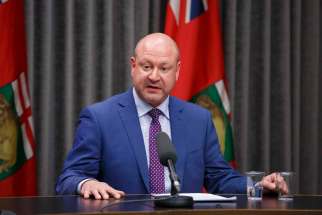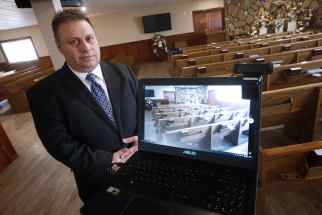Feds bet big on collaborative effort
Read this article for free:
or
Already have an account? Log in here »
To continue reading, please subscribe:
Monthly Digital Subscription
$1 per week for 24 weeks*
- Enjoy unlimited reading on winnipegfreepress.com
- Read the E-Edition, our digital replica newspaper
- Access News Break, our award-winning app
- Play interactive puzzles
*Billed as $4 plus GST every four weeks. Offer only available to new and qualified returning subscribers. Cancel any time.
Read unlimited articles for free today:
or
Already have an account? Log in here »
Hey there, time traveller!
This article was published 18/03/2020 (1780 days ago), so information in it may no longer be current.
The numbers are big — and so is the wager being made by the federal government.
An $82-billion stimulus and economic support package has been assembled in an effort to stop Canada from sliding into a pandemic-induced depression. Will it be enough?
The total value of the plan unveiled Wednesday by Prime Minister Justin Trudeau — $27 billion in direct aid and $55 billion in tax deferrals — represents an unprecedented fiscal gesture towards helping residents survive an unprecedented social and economic challenge.
Could or should Trudeau do more? In reality, Ottawa is only the first line of defence against a prolonged, pandemic-induced economic shutdown; after that, it’s going to be all hands on deck.
Individually, many have been urging those of us who can (because we remain employed) to support local businesses we value. If your favourite Thai restaurant is still doing takeout, order some dinner.
Small gestures could pay big dividends.
Even that, obviously, isn’t going to be enough. COVID-19 is going to force many to completely rethink priorities and values. The pandemic could, according to a U.S. document reported on by the New York Times, last as long as 18 months. Without an unprecedented change in attitude, it could take years, even decades, to heal the scars left on the global economy.
Normally, in an economic downturn, a healthy measure of social Darwinism comes into play. The people who keep jobs and businesses that keep their heads above water survive; the unemployed and indebted are sacrificed. Governments try to create safety nets to protect people and businesses from the ravages of a downturn, but there is more suffering than saving.
This is not a typical economic downturn. The global economy was strong when the pandemic hit; there was no mortgage or credit crisis, no hurricane knocked out all of the oil platforms in the Gulf of Mexico, no military conflict threatened trade routes or global security.
In order for all of us to survive a prolonged period of economic inactivity, the private sector is going to have to step up in ways that will test the broader commitment to the common good.
In a normal downturn, financial institutions conduct business as usual. You don’t make a payment, you suffer a penalty. You do that for an extended period of time, the bank comes and takes whatever you have left.
In order for all of us to survive a prolonged period of economic inactivity, the private sector is going to have to step up in ways that will test the broader commitment to the common good.
However, can financial institutions punish customers who have seen their livelihoods disintegrate in what was otherwise a healthy economy and facing a future where there is no other immediate prospect of employment?
A similar challenge faces employers. Already, companies big and small are looking for ways to furlough, or pay partial wages, rather than layoff workers. Others are making a commitment to continue making payroll for as long as they can, in the hopes business-as-usual will return sooner rather than later.
This kind of crisis calculus will have to employed in other areas of the private sector. Commercial and residential property owners need to think long and hard about demanding rent cheques at the first of every month. Public- and private-sector companies that provide essential services (utilities, internet, wireless communication, insurance) need to think long and hard about how to respond to customers that cannot pay bills.
The provinces are also going to have to step up: a steep hill to climb for Manitoba Premier Brian Pallister, who has shown little interest in direct government stimulus during his four years in power.
Pallister previously said he wanted “billions” in federal support; now that Trudeau has delivered, what will the first ministers do?
Some, notably Ontario and Alberta, have been so weakened their fiscal capacity is in question. Not so Manitoba, if we are to believe what the premier is telling us.
The provinces are also going to have to step up: a steep hill to climb for Manitoba Premier Brian Pallister, who has shown little interest in direct government stimulus during his four years in power.
Even though the Opposition NDP has delayed the tabling of the 2020-21 budget, Pallister has already said this will be “the most emergency-prepared budget in Manitoba history.” He can say such things because Manitoba has not faced a major crisis in the past four years, and the provincial treasury is teeming.
However, Pallister is trapped by a fiscal policy that has made tax relief and deficit reduction his only real priorities. True to form, although he hasn’t tabled the budget, Pallister already revealed it contains $400 million in cuts to the provincial sales tax and payroll tax.
When he does table the budget, he’ll have to think long and hard about whether a PST cut is appropriate in an economy where little is being bought and sold.
If we approach this crisis with the strategies applied to past economic downturns, we may find the hole we dig becomes much bigger and deeper than any before.
We can keep our economic heads above grade, but only if everyone pulls in the same direction.
dan.lett@freepress.mb.ca

Dan Lett
Columnist
Born and raised in and around Toronto, Dan Lett came to Winnipeg in 1986, less than a year out of journalism school with a lifelong dream to be a newspaper reporter.
Our newsroom depends on a growing audience of readers to power our journalism. If you are not a paid reader, please consider becoming a subscriber.
Our newsroom depends on its audience of readers to power our journalism. Thank you for your support.
History
Updated on Wednesday, March 18, 2020 10:42 PM CDT: Corrects numbers in story.




